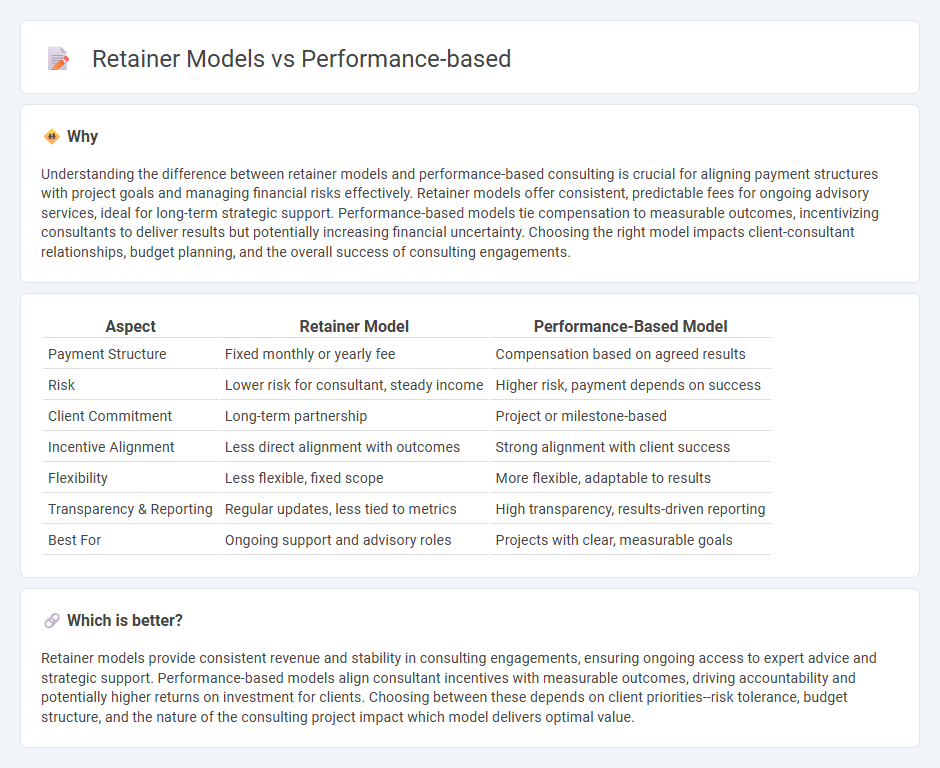
Retainer models in consulting offer clients consistent access to expert advice through a fixed monthly fee, ensuring predictable budgeting and ongoing support for strategic initiatives. Performance-based consulting ties fees to measurable results, aligning consultant incentives with client success and driving accountability for outcomes like increased sales or cost reductions. Explore the advantages of each model to determine the best fit for your business goals.
Why it is important
Understanding the difference between retainer models and performance-based consulting is crucial for aligning payment structures with project goals and managing financial risks effectively. Retainer models offer consistent, predictable fees for ongoing advisory services, ideal for long-term strategic support. Performance-based models tie compensation to measurable outcomes, incentivizing consultants to deliver results but potentially increasing financial uncertainty. Choosing the right model impacts client-consultant relationships, budget planning, and the overall success of consulting engagements.
Comparison Table
| Aspect | Retainer Model | Performance-Based Model |
|---|---|---|
| Payment Structure | Fixed monthly or yearly fee | Compensation based on agreed results |
| Risk | Lower risk for consultant, steady income | Higher risk, payment depends on success |
| Client Commitment | Long-term partnership | Project or milestone-based |
| Incentive Alignment | Less direct alignment with outcomes | Strong alignment with client success |
| Flexibility | Less flexible, fixed scope | More flexible, adaptable to results |
| Transparency & Reporting | Regular updates, less tied to metrics | High transparency, results-driven reporting |
| Best For | Ongoing support and advisory roles | Projects with clear, measurable goals |
Which is better?
Retainer models provide consistent revenue and stability in consulting engagements, ensuring ongoing access to expert advice and strategic support. Performance-based models align consultant incentives with measurable outcomes, driving accountability and potentially higher returns on investment for clients. Choosing between these depends on client priorities--risk tolerance, budget structure, and the nature of the consulting project impact which model delivers optimal value.
Connection
Retainer models in consulting establish ongoing service agreements where clients pay a fixed fee for consistent access to expertise, ensuring steady support and strategic guidance. Performance-based consulting ties compensation directly to measurable outcomes, aligning consultant incentives with client success metrics such as revenue growth or cost savings. Integrating these approaches links predictable service availability through retainers with results-driven payment structures, optimizing accountability and value delivery.
Key Terms
Compensation Structure
Performance-based compensation structures link payments directly to measurable outcomes such as sales targets, lead generation, or ROI, incentivizing agencies to deliver tangible results. Retainer models provide a fixed monthly fee for ongoing services regardless of immediate performance, emphasizing consistency and long-term collaboration. Explore the advantages and challenges of each compensation approach to align your agency's business goals effectively.
Payment Schedule
Performance-based payment models release funds only after specific milestones or results are achieved, ensuring accountability and direct correlation between performance and compensation. Retainer models involve a fixed payment schedule, often monthly, providing predictable revenue regardless of immediate outcomes. Explore in-depth differences to choose the ideal payment structure for your business needs.
Outcome Metrics
Performance-based models prioritize clear outcome metrics such as conversion rates, ROI, and customer acquisition cost, directly tying compensation to measurable results. Retainer models emphasize ongoing support and stability, with payments fixed regardless of short-term performance fluctuations. Explore how these models impact your business growth strategies and find the best fit for your marketing investment.
Source and External Links
Performance-based contracting - Performance-based contracting (PBC) is a procurement strategy where payments to suppliers are tied specifically to measurable performance metrics such as availability, reliability, and cost efficiency, motivating improved outcomes and reducing oversight of process details.
Performance-Based Compensation: What It Is And How To ... - Performance-based compensation links employee pay and bonuses directly to individual and/or business performance to motivate higher achievement, increase productivity, and clarify earnings based on measurable results.
Performance Based Learning - Operations Curriculum and ... - Performance-based learning focuses on students demonstrating ability to perform specific skills and apply knowledge in authentic, meaningful ways rather than just recalling facts.
 dowidth.com
dowidth.com